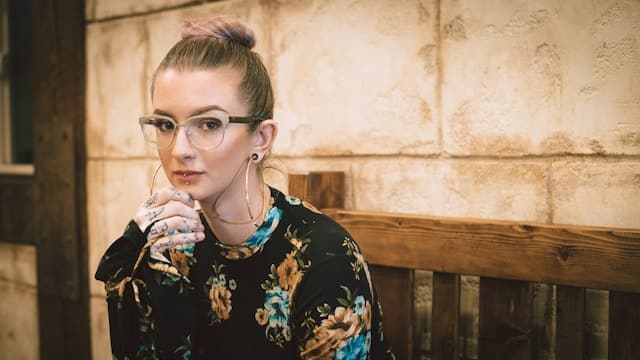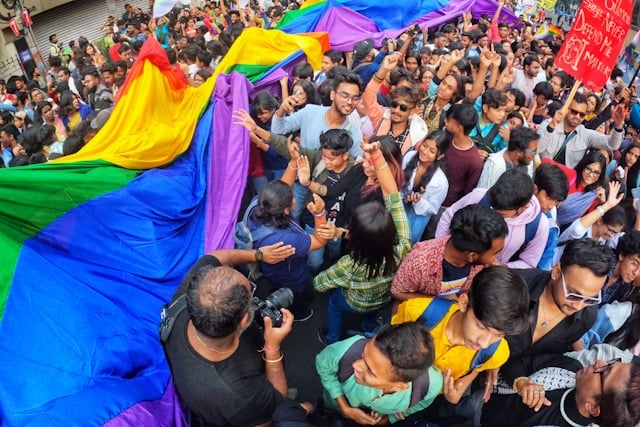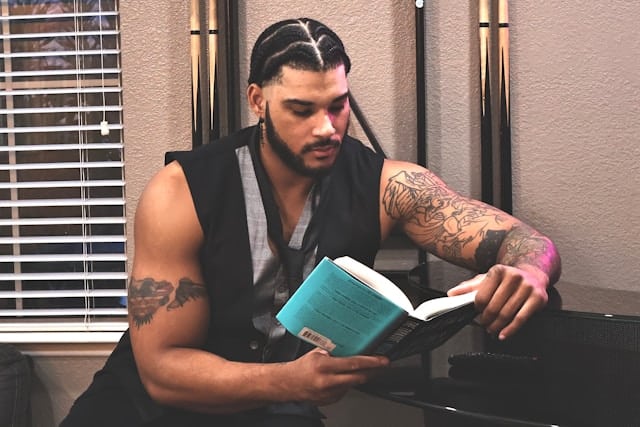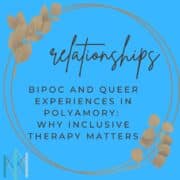
Polyamory and other forms of ethical non-monogamy are often portrayed as progressive, inclusive, and liberatory. But for many queer and BIPOC individuals, the experience of navigating polyamory can still be deeply shaped by systemic oppression, cultural invisibility, and marginalization—even within communities that consider themselves open-minded.
If you’re queer and/or BIPOC and exploring non-monogamy, you may find yourself wrestling with layers of identity that aren’t always addressed in mainstream polyamory discourse. Inclusive, culturally responsive therapy can help you unpack these complexities, validate your lived experiences, and support you in building relationships that reflect your values and honor your whole self.
Find a therapist who practices inclusive therapy.
When Polyamory Doesn’t Feel Inclusive
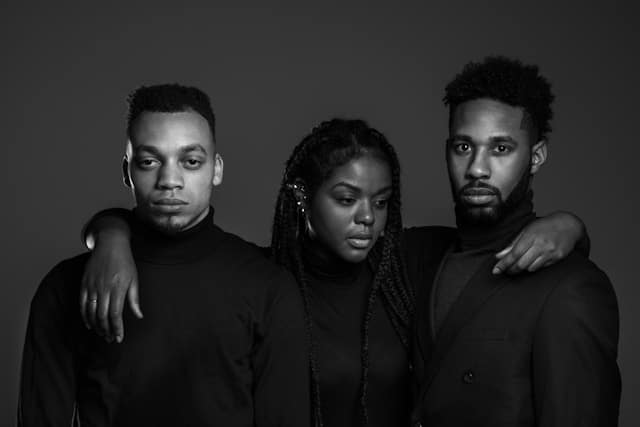
Polyamory is often described as a path toward freedom, authenticity, and expansive love. But these ideals don’t always match reality for BIPOC and queer individuals who face additional layers of marginalization within both dominant culture and non-monogamous communities.
Some common experiences include:
- Feeling tokenized or fetishized in dating dynamics
- Experiencing racial or gender-based microaggressions in polyamorous spaces
- Navigating cultural or religious values that discourage non-traditional relationships
- Struggling to find partners who share similar lived experiences
- Facing judgment or erasure from within one’s own communities
- Encountering a lack of representation in books, media, and educational spaces about polyamory
These dynamics can leave queer and BIPOC individuals feeling invisible, isolated, or like they have to “code switch” even in spaces that claim to celebrate authenticity. In therapy, these tensions often show up as internal conflict, boundary confusion, attachment wounds, or difficulty trusting others.
Questions That Bring BIPOC and Queer Clients into Therapy
Therapy can offer a nonjudgmental space to explore not just relationship structures, but how systemic and interpersonal forces shape your experience. Some of the most common questions that lead BIPOC and queer clients into therapy include:
- Why do I feel pressure to educate every partner about my culture or identity?
- Can I be polyamorous and still honor my cultural or spiritual values?
- Why does dating in polyamorous spaces feel unsafe or imbalanced?
- How do I deal with racial dynamics in my partnerships that no one wants to name?
- What does it mean to decolonize my approach to relationships?
- How can I set boundaries without being labeled “difficult” or “angry”?
These questions aren’t just about identity or polyamory—they are about safety, visibility, and emotional sovereignty. Therapy that acknowledges these layers is essential for meaningful healing and self-understanding.
Challenges That Are Often Overlooked in Mainstream Polyamory
BIPOC and queer clients often navigate unique relational dynamics that go unaddressed in many polyamory spaces. Here are a few key areas where culturally responsive therapy can make a difference:
1. Emotional Labor and Representation Fatigue
Clients frequently report feeling like the only person of color in a polycule or social space. They may be asked to educate others, navigate bias, or deal with microaggressions alone. This emotional labor can be exhausting and retraumatizing.
2. Cultural Expectations Around Family, Privacy, and Community
Non-monogamy may not be normalized in your family or cultural background, and it may be perceived as disrespectful, confusing, or shameful. Clients often feel caught between honoring family values and pursuing personal authenticity.
3. Erasure and Misunderstanding of Queer and Trans Identities
Polyamory spaces often default to cis-heteronormative norms, even when they claim otherwise. Trans and nonbinary clients may experience misgendering, exclusion, or assumptions about their roles in relationships.
4. Racism Within Polyamory Communities
Anti-Blackness, colorism, and classism show up in partner selection, event access, and unspoken social hierarchies. These realities can create real harm that needs space and care to be processed.
5. Healing from Historical and Intergenerational Trauma
Relational patterns don’t exist in a vacuum. The trauma of colonization, slavery, displacement, and systemic oppression can all shape how we attach, trust, or even imagine what love can look like. Therapy can be a space to name and heal those deeper wounds.
What Inclusive Therapy Looks Like
Inclusive therapy is not just about being open-minded—it requires cultural humility, lived experience, and ongoing commitment to social justice. Here are a few elements to look for:
Therapists Who Understand Systems of Power
An inclusive therapist is someone who doesn’t view your challenges in isolation. They understand that your relationship dynamics are shaped by broader systems—racism, colonialism, white supremacy, heteronormativity, and capitalism. This lens helps them recognize that personal pain is often deeply connected to social context. Rather than assuming you’re “too sensitive” or “overreacting,” they validate your experience and support you in naming injustice and finding empowered ways to respond.
Intersectionality-Centered Approach
Your therapist should be equipped to hold space for the complexity of your full identity. That means understanding how your race, gender identity, sexual orientation, socioeconomic status, ability, spirituality, and neurodivergence may interact and inform your lived experience. Rather than reducing you to a single label, an intersectional approach recognizes how these layers compound and influence the challenges you face—as well as the strengths you bring.
Trauma-Informed and Strengths-Based
A trauma-informed therapist prioritizes your emotional safety. They understand the impacts of intergenerational and identity-based trauma and will work to avoid reenactments of harm in the therapy space. At the same time, a strengths-based therapist highlights your resilience. They help you recognize the intelligence of your coping strategies and encourage growth from a place of empowerment rather than deficit or pathology.
Comfort Discussing Relationship Diversity
You shouldn’t have to educate your therapist on what polyamory is or defend your right to explore it. An affirming therapist understands and respects non-monogamy as a valid relational choice. They also know how to help you work through real issues that arise within it, such as jealousy, boundaries, time management, or ethical communication, without pathologizing the structure itself.
Why San Francisco Bay Area Therapy Matters
The San Francisco Bay Area is often seen as a haven for relationship diversity, queer community, and cultural innovation. But even in progressive regions, BIPOC and queer individuals can still feel unseen or underserved—especially when exploring non-monogamy.
What makes the Bay Area unique is also what makes the therapeutic needs here specific. Clients often navigate:
- High expectations for openness without adequate emotional support
- Racial dynamics in predominantly white polyamory spaces
- Spiritual or cultural identities that don’t align with dominant norms
- A desire for healing that integrates social justice, embodiment, and community
At Center for Mindful Therapy, our San Francisco-based therapists understand these layers because we live and work within them. Many of our clinicians come from queer, trans, and BIPOC backgrounds themselves, and all are trained to support the intersectional experiences of polyamorous clients.
Whether you’re in Oakland, San Francisco, Berkeley, or anywhere across the Bay Area, we offer trauma-informed, inclusive, and affirming therapy to support your growth, resilience, and relationships.
You Deserve Therapy That Sees All of You
Non-monogamy can be joyful, expansive, and deeply healing—but only when your full self is allowed in the room. Therapy isn’t just about processing emotions. It’s about reclaiming space, voice, and vision in your relationships and in your life.
You deserve a therapist who can see all of you: not just your curiosity about polyamory, but your history, your context, your identity, and your dreams. At Center for Mindful Therapy, we’re here to support that vision with compassion, skill, and cultural depth.
Browse our Therapist Directory
You Might Also Like to Read:
Am I Polyamorous or Just Curious? Exploring Identity Without Pressure
Affirming Care from Our San Francisco Trans, Non-Binary, and Queer Therapists


